President Trump pushed Americans on Thursday to demand ID at the polls as the solution to voter fraud, a day after dissolving his election integrity commission that he’d formed to investigate his own claims of massive fraud in the 2016 vote.
Mr. Trump, taking to Twitter, admitted to a rare defeat, saying Democratic-led states had blocked his commission from getting information, stymying the panel’s work.
“They fought hard that the Commission not see their records or methods because they know that many people are voting illegally. System is rigged, must go to Voter I.D.” Mr. Trump tweeted.
He has asked the Department of Homeland Security Department to pick up where the commission left off, but it’s unclear what that entails.
Tyler Q. Houlton, a spokesman for Homeland Security, signaled he didn’t expect any big changes to the department’s plans.
“At the president’s direction, the department continues to work in support of state governments who are responsible for administering elections, with efforts focused on securing elections against those who seek to undermine the election system or its integrity,” he said.
SEE ALSO: Donald Trump dissolves voter fraud commission
That seemed to contradict former commission Vice Chairman Kris Kobach, who on Wednesday had said he expected Homeland Security to pick up the work of the commission, using its databases to investigate how often noncitizens register to vote, or even cast ballots.
Mr. Houlton pointedly put distance between the department’s efforts and Mr. Kobach, saying, “Mr. Kobach is not advising the department on this matter.”
Democrats said the collapse of the commission was a major blow to Mr. Trump, saying he was unable to find evidence that the 2016 election was marred by illegal voting.
“There has never been a shred of evidence to back up Donald Trump’s outrageous claims of widespread voter fraud, and this commission was a distraction and waste of taxpayer dollars,” said Sen. Dianne Feinstein, California Democrat.
The commission, created in May, faced at least eight lawsuits, including one brought by Matthew Dunlap, the secretary of state in Maine and one of the panel’s Democratic members. He said he joined because he wanted to make sure the commission heard other voices, but quickly discovered the panel was going the wrong direction — including not even sharing its work with commission members themselves.
“Everything was happening in a very secretive way and that gave rise to a lot of suspicions for people on the outside,” Mr. Dunlap told The Washington Times, saying he decided to sue in October.
A judge ruled in his favor in December, and weeks later Mr. Trump canceled the commission — leaving Mr. Dunlap to question the panel’s motives in the first place.
“The most dangerous thing in public policy has always been someone who cares more about the result than the process,” he said.
Republican commissioners said they were disappointed the panel was dissolved, but said they understood Mr. Trump’s decision in light of the obstruction they faced in trying to get information.
“The obstacles and impediments used to hinder the work of the commission is evidence that there are many politicians and activists who want to prevent the American people from finding out the truth,” said Hans von Spakovsky, senior legal fellow at the Heritage Foundation and one of the commissioners.
With the commission over and Homeland Security’s future role questionable, Mr. Trump’s push for voter ID is likely to garner the most attention.
Seventeen states had some form of photo-ID requirement for voters as of last year, and 15 others required ID but it doesn’t have to have a photo. The rest didn’t require ID to vote, according to the National Conference of State Legislatures.
Mr. von Spakovsky said the federal government could enact a law requiring ID for all federal elections, which states would have to enforce. But he said even if Congress could pass it, states such as New York and California would refuse to implement it.
J. Christian Adams, president of the Public Interest Legal Foundation and another commissioner, said voter ID wouldn’t solve the problem of noncitizens voting. His organization has found thousands of self-admitted noncitizens who managed to register to vote at state motor vehicle bureaus.
“Most of the aliens getting on the rolls are getting there because they are getting state photo ID,” he said. “The Motor Voter systems needs to be fixed because ineligible people are getting registered to vote when they are getting photo ID.”
• Stephen Dinan can be reached at sdinan@washingtontimes.com.
• Sally Persons can be reached at spersons@washingtontimes.com.




Please read our comment policy before commenting.